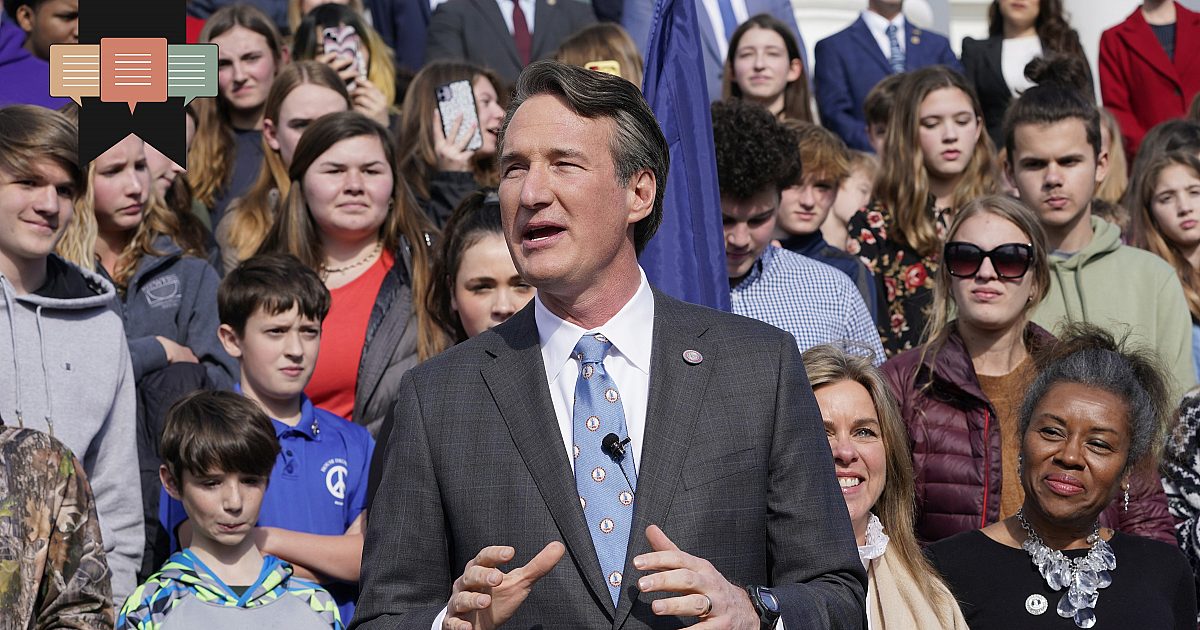Evangelical Responsibility Extends to Politics
As Glenn Youngkin successfully campaigned last year as the Republican candidate for governor of Virginia, several critics pointed to his religious ties. Simply put, Youngkin supported Orthodox dissenters from the Episcopal Church as it embraced serious heresy and sin. As this denomination further supplanted biblical faith with universalism and sexual immorality, several northern Virginia congregations severed ties, citing the institution’s total abandonment of Christianity.
Youngkin generously supported Holy Trinity Church in McLean, Va., a conservative congregation that has no official connection to an Anglican body. Whereas in the past generous donors to any church would have been considered upstanding citizens, today such religiosity – when leaning conservatively on moral issues – can be a major political liability. Apparently marching in Pride parades and supporting hours of drag queen storytelling is fine, but material support for Orthodox Christianity sets a bad example for children. Specifically, there is a popular notion that ardent and traditional Christians should not be in a position of significant political power and, if they are, they had better not act according to their religious principles, especially in regard to concerns morality.
Surprisingly, this claim comes from both inside and outside the church. Secular elites and even some prominent religious voices bemoan the presence of politically engaged Christianity, especially when it opposes the broader agenda, values and conduct of the global managerial class. Certainly, many political candidates are not religious and must put on a show to attract conservative voters. Other well-meaning (or power-hungry) politicians have done poorly in determining how their faith should inform and guide their conduct and policies. The result is laudable examples of moral blindness, obvious religious ignorance and embarrassing scandals. And, it should be noted that such cases occur on both the right and left sides of the aisle.
Many liberal leaders claim a religious identity for themselves, even though the Democratic Party’s embrace of abortion-on-demand and sexual license has pushed many religious identities to breaking point. Only those with minimal religious beliefs, such as adherents of mainstream Protestantism or Reform Judaism, experience little tension in this regard.
A good number of self-described evangelicals today, however, seem uncomfortable with any exercise of political authority by other evangelicals. They see political power as inherently corrupt and worldly, and its exercise by Christians as a compromised witness to the watching world. A whole intellectual class exists to remind evangelicals that they must decouple their theology from their politics or stop making an idol of politics. They become uncomfortable with the idea of laws and policies that punish, fine, and even imprison people for various offences.
This tendency is not rooted in historical Protestantism. The Radical Reformation rejected the post-Constantinian Christian tradition at its root (based), including many centuries of political theology. Initially, this manifested in violent revolts and sectarian utopian projects until the influence of pacifists like Menno Simons and Jakob Ammann became dominant. The radical tradition was revived somewhat by influential neo-Anabaptist theologians like John Howard Yoder. From this perspective, one of the great tragedies of history was the conversion of Constantine the Great and the resulting legalization and establishment of Christianity. Before that, Christianity was pure because it was politically impotent. Since then, the Church has become stained with political commitment.
Now, most people aren’t coherent thinkers, so many embarrassed evangelicals don’t give up politics altogether. They intuitively realize that political authority is necessary and not inherently sinful. They simply don’t have the courage to perform such oaths of office themselves or to see the same performed and exercised by other biblical Christians, for it will end up being “wicked” and lacking in “seductiveness.”
This argument produces a convenient evangelical paralysis that is exploited by secular politicians, pressure groups and institutions. If Christians cannot take power and rule according to their first principles, unbelievers are quite ready to do so.
It’s a recipe for continued political defeat combined with unseemly morality. If we believe that society should commit to certain laws and not others, it means using the means to have those necessary laws passed – in the right way, with the right motive, towards the ends of rights. There is a difference between seeking power for power’s sake and pursuing a political office that holds the power to shape policy that benefits everyone in society.
Powerful forces of evil take advantage of a politically disengaged Christianity. Christians hold vital beliefs about sex, the sanctity of life, marriage, justice for the innocent, and exploitation of the poor. Sunday work, the sale and distribution of addictive substances, a deeply corroded public education apparatus, gambling, payday loans, pornography, no-fault divorce laws, financial irresponsibility and predatory financial practices yield immense profits or provide tools to subjugate a populous freedom. And they are threatened by evangelicals wielding political authority.
It’s one thing to have political influence taken away from you. It is quite another to give up that influence on our own.


Comments are closed.